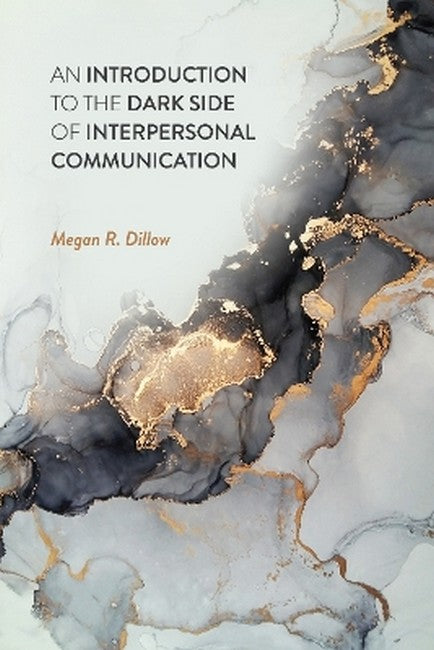Megan R. Dillow (Ph.D., The Pennsylvania State University) is an associate professor in the Department of Communication Studies at West Virginia University. She conducts theoretically driven research investigating communication between people in interpersonal relationships. Dr. Dillow's primary research interests are focused on the dark side of close relationships, especially communicative responses to major relational transgressions. She is a 2022 recipient of the Eberly College Outstanding Teacher Award at West Virginia University.
Request Academic Copy
Please copy the ISBN for submitting review copy form
Description
"This book will be the most comprehensive textbook we have available to teach a course focused on the dark side of close relationships. Beyond that, the book will make an outstanding complement to almost any other textbook on the general topic of close relationships. The content not only covers the major issues discussed in most research considered to be part of the dark side of close relationships, but does so in way that would be accessible to undergraduate students." Stephen M. Yoshimura, Professor of Communication Studies, University of Montana "An Introduction to the Dark Side of Interpersonal Communication presents a solid foundation of historical and recent developments of scholarly understandings of the nature, functions, and outcomes of dark side behaviors common in close relationships. The content is well grounded in theory and research, but the style is approachable and readers will find new insights in every chapter. [...] The boxed material on mediated contexts is quite valuable. Readers will be able to relate to the examples presented and better comprehend how traditional face-to-face processes might extend to mediated environments. [...] [Similarly.] the 'Flipping the Script' sections, which showcase the paradoxes of relational behaviors ... will likely generate the most intrigue and discussion from students. [...] I appreciate the writing style, organization, and level of content. The chapters are easy to read and the style of writing is inviting. Complex theories or empirical findings are presented clearly and at a level that can be grasped by a wide audience." Joshua R. Pederson, Associate Professor, College of Communication and Information Sciences, The University of Alabama "I love Dillow's proposal and believe the book makes an important contribution. Namely, it provides an approachable overview for undergraduate students. The book will be desirable for most undergrad dark side courses. ... I love Dillow's writing and the content that she includes. I also appreciate her consistent commitment to conceptual clarity, delineating the topic of interest from related terms. This makes teaching so much easier, and invites discussion of related areas. I believe it'll also help students better understand their own lived experiences. ... The book is great...will be very well received...makes a solid contribution and will likely be widely adopted." Sean M. Horan, Associate Professor of Communication Studies, Texas State University "I appreciate that this text is geared toward college students rather than graduate students or established scholars; the level of explanation/detail and exemplars used are highly appropriate for the audience. [...] I think that the inclusion of the pedagogical elements and vignettes is great, and I appreciate the ways in which they are tied to the text. I like [that] the discussion questions push readers to challenge the literature and consider its relevance across different relational contexts. The book is well-suited to the audience, it's unique in the field, and is well-organized and thorough." Stephanie A. Tikkanen, Assistant Professor, School of Communication Studies, Ohio University "The synthesis of a wide body of work is impressive. [...] The material is really interesting and engaging [and] well-written. [...] [This book will] be valuable [because it] contains more updated sources and also has the cohesiveness of a textbook." Rachel McLaren, Associate Professor, Director of Undergraduate Studies, Department of Communication Studies, The University of Iowa "The most impressive aspect of this material in terms of adopting it for my undergraduate class is the accessibility of Dr. Dillow's writing. The books that are currently on the market seem targeted at graduate students, so this book's accessibility and relatability set it apart. [...] I appreciate the communication focus of this book and Dr. Dillow's emphasis on research, theory, and academic debate! [Other key strengths overall include:] focus on complexity of issues (as opposed to one-sided presentation of ideas); relatable examples and supplementary content; balance of research findings and real-world examples; common themes that bring together multiple chapters." Kelly G. McAninch, Assistant Professor, Director of Undergraduate Studies, College of Communication and Information, University of Kentucky "The book is very readable and students will enjoy it. It's an easy read, but full of good, relatable information. Professors should find that they can have many good discussions based on the information in the book." Robin Kowalski, Centennial Professor of Psychology, College of Behavioral, Social, and Health Sciences, Clemson University "The single most impressive aspect of this work is that it combines previous dark side research in an updated fashion with a focus on most of the major 'dark' topics. [...] [This text offers students] improved understanding of the dark side and thus hopefully better choices, responses, and relationships." P.L. Secklin, Department of Communication Studies, Saint Cloud State University "[Dr. Dillow] does an excellent job synthesizing and reviewing the most important literature within the relevant dark areas of close relationships. [...] [She] excels at organizing empirical research in a systematic way (e.g., individual, relational). [...] [Particular strengths of the book include:] excellent synthesis of an important area of inquiry; well written; real life illustrations and applications." Lindsey S. Aloia, Associate Professor, Department of Communication, University of Arkansas

